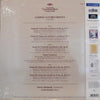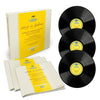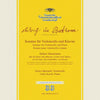







Beethoven - Sonatas For Violincello and Piano - Enrico Mainardi & Carlo Zecchi (3LP, Coffret)
Ludwig van Beethoven - Sonate for Violoncello and Piano in F Major Op. 5 N°1, in G Minor Op. 5 N°2, in A Major Op. 69, in C Major Op. 102 N°1, in D Major Op. 102 N°2 & Seven variations from the duet “bei Mannern, welche liebe fuhlen” from Mozart’s Magic Flute Opera
Enrico Mainard, violoncello
Carlo Zecchi, piano
3 LPs, Box set
Original analog Master tape : YES
Heavy Press : 180g
Record color : black
Speed : 33 RPM
Size : 12'’
Mono
Studio
Record Press : Pallas
Label : Analogphonic
Original Label : Deutsche Grammophon
Recorded October 17-20, 1955 (A1-B3), May 27-30, 2956 (C1-D1), January 6-10, 1957 (E1-F3) at Beethovensaal, Hanover, Germany
Remastered by Rainer Maillard at Emil Berliner Studios
Originally released in 1957
Reissued in 2020
Tracks:
Side A : Sonate für Violoncello und Klavier F-dur op. 5 Nr. 1
- Adagio sostenuto
- Allegro
- Allegro vivace
Side B : Sonate für Violoncello und Klavier g-moll op. 5 Nr. 2
- Adagio sostenuto ed espressivo
- Allegro mollo piu tosto presto
- Rondo: Allegro
Side C : Sonate für Violoncello und Klavier A-dur op. 69
- Allegro, ma non tanto
- Scherzo: Allegro molto
- Adagio cantabile
- Allegro vivace
Side D : Sieben Variationen über das Duett »Bei Männern, welche Liebe fühlen« aus der Oper »Die Zauberflöte« von Mozart
Side E: Sonate für Violoncello und Klavier C-dur op. 102 Nr. 1
- Andante - Allegro vivace
- Adagio - Tempo d'Andante - Allegro vivace
Side F : Sonate für Violoncello und Klavier D-dur op. 102 Nr. 2
- Allegro con brio
- Adagio con molto sentimento d'affetto
- Allegro fugato
Awards:
TAS Super LP List! Special Merit: Classical
Reviews:
"Enrico Mainardi's talents were nurtured from an early age. He was given a small cello at the age of three, had his initial lessons a year later, and made his recital début at the age of eight, playing a Beethoven sonata. His father put him into the bruising life of a touring child prodigy at that point, touring Europe. When he appeared in Bologna, his accompanist was the esteemed Italian composer Ottorino Respighi. He débuted in London at the age of 13 at a Promenade Concert conducted by Sir Henry Wood. One of the most important of his early appearances was at the Bach-Reger Festival in Heidelberg, where he astonished the audience with his playing of the Cello Suite in C major by Bach. He was 16 at the time.
In 1924 he went to Berlin to study with one of the leading teachers of the day, Hugo Becker. He was able to re-establish his concert career and this time he added performance in chamber music to his activities. He made notable solo appearances in recital and with the leading orchestras and conductors. In 1933, he was appointed professor of cello at Santa Cecilia and in 1941, succeeded his teacher Becker at the Hochschule für Musik in Berlin on the latter's death. It took him a while to re-establish his career internationally after World War II. He became especially known for his chamber music performances. He extended his fame in Germany through much of the rest of Europe. He insisted that his pupils learn the entire score for whatever pieces they were playing, not just their own part. This included knowing what all the instruments of the orchestra were doing at any given moment in a concerto.
Mainardi was a charismatic performer with very handsome looks and a flair for dressing well. He said he chose his clothing for a concert with a view to what was appropriate for the particular music. Despite this, he did not indulge in platform histrionics to showcase the music or its particular difficulties. His repertoire was especially known for its high quality and intellectual content. Thus, he became known as a reserved performer lacking showmanship, which was, by all accounts, at odds with his off-stage personality. Consequently, he went into history as a musician's musician, rather than a crowd-pleasing one." Joseph Stevenson, AllMusic

